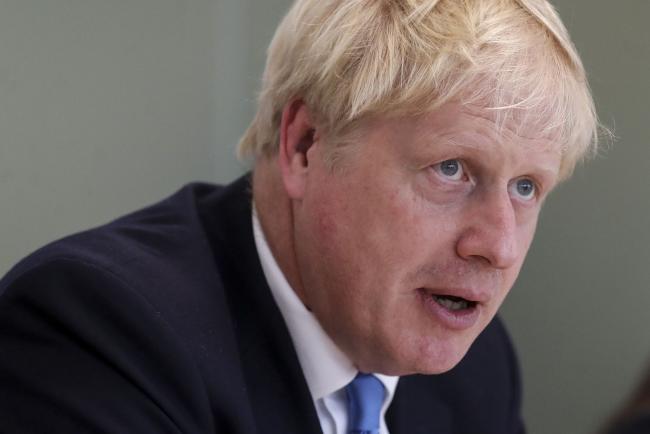(Bloomberg) -- U.K. Prime Minister Boris Johnson made his first public attempt to renegotiate the Brexit deal by telling the European Union he wants to explore different ways to prevent a hard border on the island of Ireland.
In a letter to European Council President Donald Tusk, Johnson said he wants to replace the so-called backstop provision in the divorce agreement with a “legally binding commitment” not to build infrastructure or carry out checks between Northern Ireland and the Republic of Ireland -- the U.K.’s new frontier with the EU -- as long as the bloc promises the same.
The backstop, the most contentious part of the Brexit deal agreed between Johnson’s predecessor, Theresa May, and the 27 other EU governments in November, would keep the U.K. following EU customs and many other trading rules indefinitely unless it’s superseded by a trade agreement that removes the need for controls or checks along the Irish border. The EU has said it’s needed as a permanent guarantee and isn’t up for negotiation.
Johnson said both sides must look at other ways to keep the border free of checks and wants a commitment “to put in place such arrangements as far as possible before the end of the transition period,” which could be as early as the end of 2020. A transition will only apply if the U.K. leaves with a deal.
No Specifics
But Johnson didn’t set out what the arrangements should be, and acknowledged there “will need to be a degree of confidence” about what would happen if they were not “fully in place” at the end of the transition period. That suggests he is prepared to replace the backstop with a different guarantee.
What a No-Deal Brexit Would Mean for the Irish Border: QuickTake
Johnson made the removal of the backstop from the Brexit deal, which was not approved by the British Parliament, his key pledge on becoming prime minister last month. He’s repeatedly said that if the EU doesn’t comply, the U.K. will leave the bloc on Oct. 31 without a deal.
“Time is very short,” Johnson said in his letter, which was published late Monday. “But the U.K. is ready to move quickly, and given the degree of common ground already, I hope that the EU will be ready to do likewise.”
In many ways, Johnson’s position echoes May’s. She also wanted to avoid a hard border in Ireland, while having different regulations between the U.K. and EU, and wanted to find alternative “arrangements” to deliver this. She, too, was willing to offer a guarantee if those arrangements couldn’t be agreed.
Deal Hopes
Johnson said earlier Monday that while he would prefer to negotiate Britain’s exit from the EU, he was determined to get the country out of the bloc, and was ready for any “bumps in the road.” His argument is that by talking up Britain’s readiness for a no-deal Brexit and willingness to go through with one, he’s more likely to persuade the EU to give ground.
The prime minister travels to Berlin and Paris this week to discuss Brexit with German Chancellor Angela Merkel and French President Emmanuel Macron. EU leaders were “showing a little bit of reluctance” to change their position, he said, but he was “confident” they’ll eventually shift and give him a deal.
The main opposition Labour Party’s Brexit spokesman, Keir Starmer, said Johnson’s plan didn’t contain any solutions.
“This letter confirms that Johnson has no negotiating strategy,” Starmer said on Twitter. “He suggests (unspecified) alternatives to the backstop. And if they don’t work: further (unspecified) alternatives to the backstop. Why didn’t anyone think of that before!”
No-Deal Row
With Johnson showing no sign of backing down over his willingness to leave the EU without an agreement, Labour Leader Jeremy Corbyn demanded the prime minister release the latest assessment of the impact of a no-deal Brexit, after the government said a leaked copy of its plans was no longer current.
The Sunday Times newspaper reported that “Operation Yellowhammer,” the government’s plans for leaving the EU without a deal, warned of a three-month “meltdown” at ports, along with shortages of food and medicine. Michael Gove, the minister in charge of Brexit preparations, said on Sunday this was out-of-date information based on “worst-case planning.”
“If the government wants to be believed that it doesn’t represent the real impact, it must publish its most recent assessments today in full,” Corbyn said in a statement. “Boris Johnson’s denials can’t be trusted, and will do nothing to give businesses or consumers any confidence that the dire state of affairs described in these documents aren’t right around the corner.”
What ‘No-Deal Brexit’ Means and Why It’s a Big Risk: QuickTake
Meanwhile the government is about to launch a publicity blitz aimed at preparing the public for a no-deal Brexit, according to a government official.
Whereas previous information campaigns were aimed at businesses -- with long technical briefings on how different sectors should prepare for the possibility that the U.K. leaves the European Union without a deal -- the new one will be more user-friendly, said the official, who asked not to be identified.
EU citizens living in Britain are being urged to apply for settled status ahead of the Brexit deadline. But despite the government warning that free movement from the bloc will end on Oct. 31, the official said most changes are likely to be symbolic in the short term. The Home Office said in a blogpost that EU citizens still had until December 2020 to make their settlement applications.
